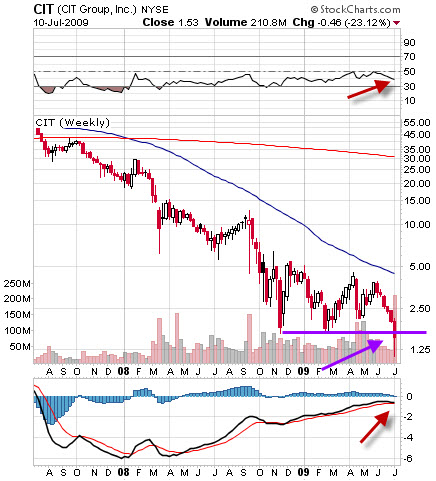From a recent In Session post:
This week, the big news is the trouble brewing at CIT group. If you don’t know them, they are a large financial services firm, mainly providing loans and financing to mid-sized companies.
Their business model involves lending at one rate, then selling the loans to the market at a slightly lower rate and pocketing the difference. Something like a bank, but they do not leverage their loans off of deposits. Of course, I am simplifying the business model of a very large and diversified company. Suffice it to say that the way the securitization market has been operating, and with the cost of capital climbing the way it has, their business model has gone to heaven. It has shuffled off the mortal coil.
At any rate, things have not looked good for a while. This is one of the more horrid-looking charts you will ever see…
…with a technical breakdown below the lows (purple line and arrow), while the MACD and RSI (red arrows) say this thing is just now rolling over or still has a ways to fall, respectively.

Last week there was this news:
CIT in talks with US; plunges on liquidity worry
NEW YORK (Reuters) – CIT Group Inc (CIT.N) said it is in active talks with the U.S. government to gain access to a key lending program, as the commercial lender’s stock fell to a record low on Friday on concerns that it would be excluded.
The shares fell as much as 39.2 percent on reports the Federal Deposit Insurance Corp will reject the New York-based company’s effort to join its Temporary Liquidity Guarantee Program because CIT’s credit quality is worsening.
The program has allowed dozens of financial services companies, many of which are suffering big losses, to sell "triple-A" rated debt at low cost. Through May 31, about $345.8 billion of debt issued under the program was outstanding, according to the FDIC website.
CIT said it is having an "active dialogue" with the government, but that there is no guarantee the FDIC will approve its application.
The lender to small- and mid-sized businesses became a banking company in December and obtained $2.33 billion of funds from the federal Troubled Asset Relief Program.
But it has lost close to $3.3 billion since the end of 2007, and in a May regulatory filing said it had $10 billion of funding needs to address in the year ending March 31, 2010.
On Wednesday, Fitch Ratings downgraded CIT deeper into "junk" status, a move that affected $35 billion of CIT debt.
And now this warning from CIT cautioning (threatening?) the government to not let it fail:
CIT Group Says Its Failure Risks Demise of Customers
July 13 (Bloomberg) — CIT Group Inc., the century-old lender that hasn’t been able to persuade the government to back its debt sales, says its demise would put 760 manufacturing clients at risk of failure and “precipitate a crisis” for as many as 300,000 retailers.
A collapse would ripple across the “small and medium-sized businesses who rely on CIT to operate — to pay their vendors, ship goods to their customers and make their payroll,” the New York-based lender said in internal documents obtained by Bloomberg News that make the case for its importance to the U.S. economy. CIT spokesman Curt Ritter declined to comment on the documents.
“A CIT default would create liquidity issues for the corporate sector,” Ed Grebeck, chief executive officer of debt consulting firm Tempus Advisors in Stamford, Connecticut. “If CIT isn’t doing trade finance and lending, its customers will look to other banks for replacement and from what I’ve seen, they aren’t willing to step up.”
CIT has already retained the bankruptcy experts at Skadden, Arps, Slate, Meagher & Flom LLP, so they’re gearing up for a probable date with bankruptcy.
This is an event worth watching this week, because this is a very, very large compan. And so far, the government looks like it is going to let it go the way of Lehman’s.
This would certainly roil the markets anew.
